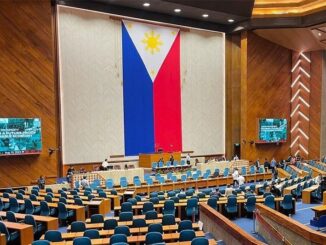
MANILA, Philippines — The latest version of the proposed Magna Carta of Filipino Seafarers approved by Congress brought back the bond requirement for seafarers appealing a monetary claim — a controversial provision that the international shipping industry lobbied to retain.
For the third time, both the House of Representatives and the Senate on Wednesday ratified the bicameral conference committee report on the proposed Magna Carta of Filipino Seafarers, drawing criticism from senators puzzled by the “strange” legislative process.
The measure was first enrolled by the bicameral conference committee for President Ferdinand Marcos Jr.’s signature in December 2023 but the Senate recalled the bill.
After reconstituting another bicameral conference committee, the body came up with a second bicam report that left out the bond requirement provision. This was ratified by the Senate on May 22 and the House on May 23.
However, the bill again did not make it to Malacañang for signature. On July 29, another bicam was reconstituted and produced a third version of the measure, which both chambers of Congress ratified on Wednesday.
The “very strange and unusual” path taken by the bill was criticized on Wednesday by Senate Minority Leader Koko Pimentel, who voted against its ratification.
“What could have been the serious concern? What has been the serious concern which has caused the strange and unusual path this measure has taken?” Pimentel said.
Sen. Risa Hontiveros, who also voted against the ratification, explicitly called out the bicam for reconvening just to restore the controversial provision requiring seafarers to pay an execution bond.
“Nakakadismaya na pilit binalik ang bond sa Magna Carta of Seafarers. Poprotektahan sana ng batas na ito ang ating seafarers, pero parang lalo lang silang inilagay sa alanganin,” Hontiveros said.
(It’s disappointing that they insist on reinstating the bond in the Magna Carta of Seafarers. This law was supposed to protect our seafarers, but it seems to have put them in an even more precarious situation.)
The “battle” to delete Section 59 — which the International Chamber of Shipping (ICS) and the International Maritime Employers’ Council (IMEC) asked President Ferdinand Marcos to restore — was “arduous,” Hontiveros said in a news release.
“Dahil sa pag-urong sulong sa bicam, binigyan ang ating seafarers ng isang probisyong hindi patas at potentially unconstitutional,” she added.
(Because of the back-and-forth in the bicam, our seafarers have been given an unfair and potentially unconstitutional provision.)
Sen. Raffy Tulfo, who presented the bicam report for ratification, said that there were complaints from certain sectors when the harmonized version of the bill was sent to the president for signing.
Sen. Joel Villanueva, who expressed his reservations about the measure before voting for its ratification, asked where the proposal to restore the bond provision came from.
“There are some colleagues in the lower house that suggested bringing back the bond provision for the purpose of employability of seafarers,” Tulfo said.
The Concerned Seafarers of the Philippines (CSP), a group for seafarers and their families who oppose the bond provision, considered it a “win” when it was removed from the second bicam report on the proposed Magna Carta for Filipino Seafarers.
The provision “would be an unjust burden on seafarers, many of whom are already in financial distress,” the group said. — Cristina Chi





Be the first to comment